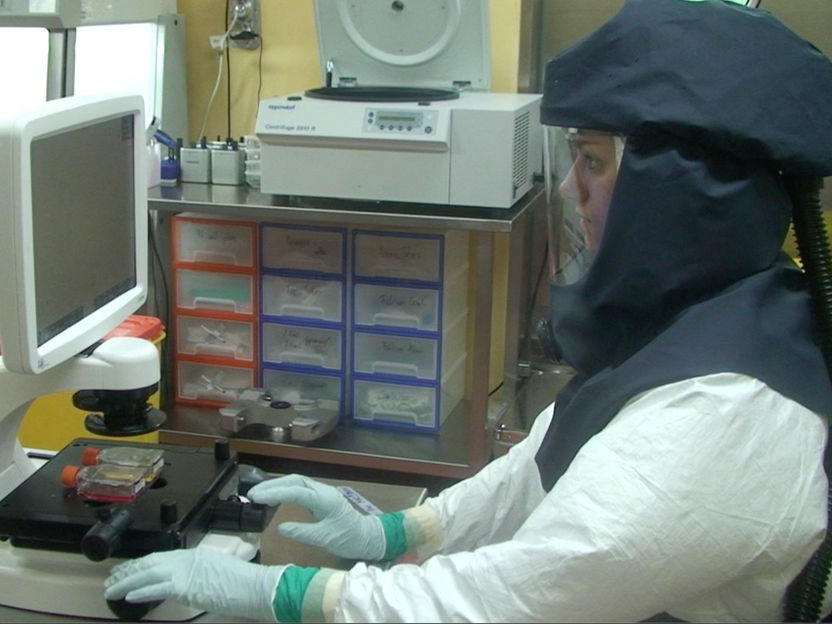Bern coronavirus clone goes "viral"
Rapid reconstruction of SARS-CoV-2 using a synthetic genomics platform
Researchers in virology and veterinary bacteriology at the University of Bern have cloned the novel coronavirus (SARS-CoV-2). The synthetic clones are being used by research groups worldwide to test corona samples, find antiviral drugs and develop vaccines as quickly as possible. The method developed in Bern can also be used in future to combat other highly infectious viruses.

Working at the high-security laboratory of the Institute of Virology and Immunology (IVI).
© IVI
In the high-security laboratory of the Institute of Virology and Immunology (IVI) of the Federal Food Safety and Veterinary Office (FSVO) in Mittelhäusern and at the Vetsuisse Faculty of the University of Bern, the researchers successfully reconstructed the coronavirus from synthetic DNA (deoxyribonucleic acid). DNA copies containing parts of the coronavirus genome were introduced into yeast cells and assembled into a complete copy. The researchers then used this to produce infectious coronaviruses.
"We replicated the virus within the space of a week," says Professor Volker Thiel from the Institute of Virology and Immunology. The researchers used a yeast cell system developed in Bern which has now proved its value in an epidemic situation for the first time. "We have optimised this system to allow us to clone coronaviruses and other viruses quickly," adds Professor Jörg Jores from the Institute of Veterinary Bacteriology at the University of Bern. The Bern method allows a rapid response to new and fast-spreading viruses and their characteristics in real time – i.e. during an outbreak.
The provisional results of the study, which has also attracted the interest of the World Health Organization (WHO), were already available for scientific discussion on a preprint server. The final results have now been published in the journal Nature. Professor Thiel’s group has supported many of the world’s diagnostic laboratories by providing the synthetic clones, allowing faster and more accurate testing of corona samples. The Bern researchers have also been inundated with requests from companies and fellow researchers to test potential antiviral agents on the clones in the high-security laboratory.
Major technical progress
The number of infections caused by the novel coronavirus currently stands at more than 3,500,000 worldwide. Researchers and pharmaceutical companies around the world are working under intense pressure to test samples more efficiently and develop vaccines. The synthetic viruses cloned in Bern represent a major step forward in the diagnosis of patient samples and the development of new antiviral agents. Viruses are difficult to clone: they are tinier than even the smallest bacteria and extremely variable. "Our model system using yeast cells shows that it is ideally suited for reconstructing coronaviruses and other viruses," explains Professor Thiel. "This technical progress shows that the University of Bern is at the forefront of coronavirus research," comments a delighted Professor Christian Griot, Head of the IVI.
Epidemiologists from the Institute of Social and Preventive Medicine (ISPM) at the University of Bern had already calculated the spread of the coronavirus back in January. The findings of the current study were sent ahead of publication to the WHO, where they were used to assess the global situation.























































